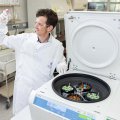A $50 million plus Institute for Molecular Bioscience, set to become one of the nation's major engines of research and development, has been given the green light at the University of Queensland thanks to major backing from the State and Federal governments.
University of Queensland Vice-Chancellor Professor John Hay described the move as a coup for Queensland and great news for the nation.
He said the State and Federal Governments had shown great vision in backing the project with $15 million each to match $15 million from the University's own resources and $10 million from an overseas source.
Professor Hay said the development was of national significance and wholly unprecedented within Queensland. He said it would reward the investment many fold through new internationally competitive technology, income-earning research services, advanced training for the Australian work-force and new jobs.
Professor Hay praised the strategic vision and leadership of the State and Federal Governments in committing to the project.
The Commonwealth Federation Fund contribution of $15 million announced by Science Minister John Moore, complementing $15 million announced by Queensland Premier Rob Borbidge, were key contributions in building the foundation to enable the project to proceed. Planning was underway with construction starting in 1999 and completion likely by late 2000.
"This is a project of scientific, educational and economic significance the likes of which Queensland has not seen before," Professor Hay said.
"The new Institute will give Queensland an R&D engine, fuelled by a combination of genome analysis, molecular biology and structural biochemistry, hitherto unheard of outside the international pharmaceutical industry," he said.
Professor Hay said: "The Government's decision is vital to the establishment of key infrastructure for a clever Queensland and for positioning the State to take part in 21st century science.
'The Government has recognised the strategic importance of keeping Queensland globally competitive in biotechnology. It will lead to new industry and business enterprise, technology exports and to more jobs.
'It will lead to $150 million worth of research activity in the first five years.'
Professor Hay said the Federal Government's financial contribution would be decisive in bringing to fruition the University's plans for the world's first institute to integrate genome (genetic) research with cell biology, structural biology and bioinformatics.
"The University has put in the hard yards in bringing together a nucleus of world-class creative researchers and the supporting them with a multi-million dollar investment in equipment. The State and Federal Government's contributions will provide vital leverage to consolidate this development as a strategic national asset,' Professor Hay said.
The Institute is designed not only to integrate the advanced research in molecular biology at the University of Queensland, but also to allow the opportunity for other public and private research organisations engaged in similar research, to co-locate in the Institute, for mutual benefit and to take advantage of the increased critical mass, combined intellectual and technical resources, common infrastructure and equipment, and operational synergies.
'The Commonwealth Scientific and Industrial Research Organisation has indicated its interest in participating in the project, which may result in the Institute being enlarged. The University is also discussing participation in the Institute with other existing and emerging research organisations.'
Professor John Hay said that the new Institute would bring together six internationally competitive biotechnology research centres, including the University's Centres for Molecular and Cellular Biology and Drug Design and Development.
'These six centres represent a spectrum of modern R&D in biology and biotechnology that is unique in Australia and the region,' he said.
'All of them were established with judicious use of University and Government resources, and collectively they now earn over $20 million annually and employ 350 skilled professionals.
'They are committed not only to high-quality strategic and basic research, but also to the successful transfer of the resulting technology to Australian industry.'
Professor Hay said biology and biotechnology were entering a period of evolutionary change and unparalleled growth, based on the emergence of genome research, combinatorial chemistry, and high throughput genetic and chemical screening, which would drive the new high technology industries of the 21st industry.
'The Institute will provide unprecedented opportunities for new products and services, including a new generation of biopharmaceuticals and genetic diagnostics, and advanced strains of plants and animals that will revolutionise Queensland's primary industries. Each of these sectors represents billions of dollars of economic activity and untapped opportunity for Australia.'
The new Institute's combination of genomics, structural and cellular biology, high throughput screening and molecular design would provide a research environment hitherto unheard of outside the international pharmaceutical industry. These were all the key ingredients that would drive the development of new pharmaceuticals in the 21st century, he said.
The Institute will have six main divisions: genomic research, developmental biology, cellular biology, structural biology, molecular design and bioinformatics
Important strategic benefits resulting from the Institute would include:
- The creation of an internationally competitive and internationally recognised research environment capable of making significant scientific contributions and generating new knowledge for Australia and beyond.
- The provision of an integrated multidisciplinary biotechnology research complex with a high level of expertise and critical mass which is able to undertake world competitive R&D leading to new products and technologies to benefit the Queensland and Australian economies.
Together this would result in a substantial strengthening and development of Australia's
biomedical, agricultural and biotechnology R&D base, Professor Hay said.
For further information, contact Professor Hay, telephone 07 3365 1300.



